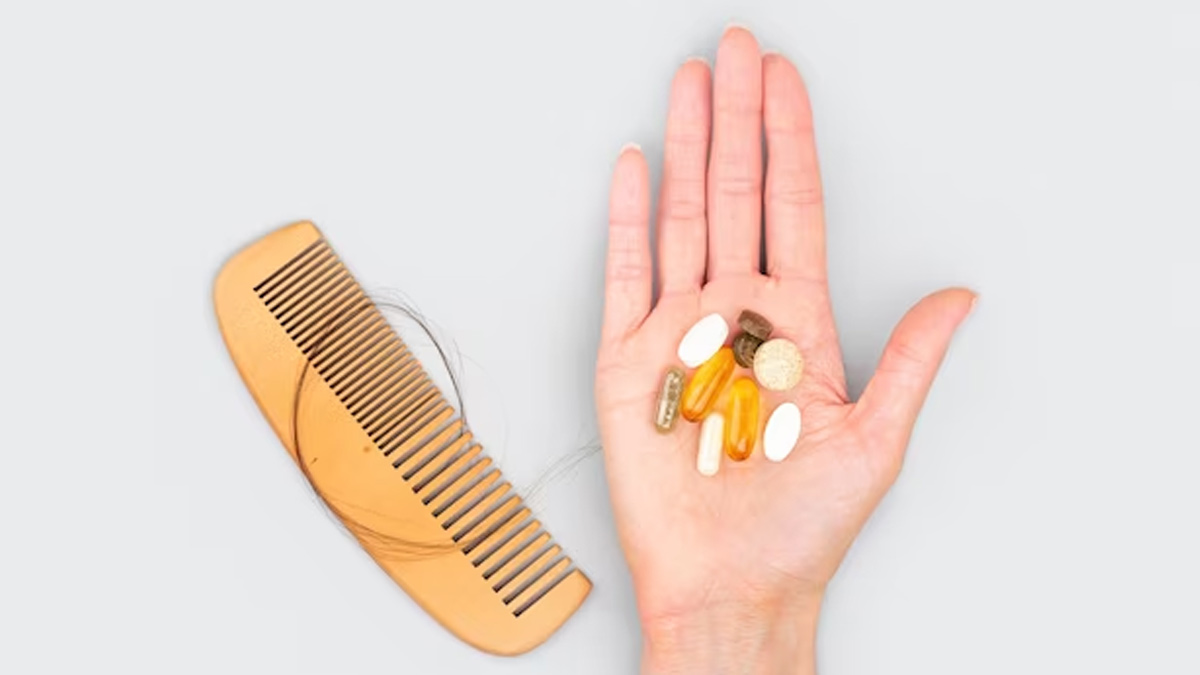
In the race of glowing skin, strong nails, a healthy gut, or better immunity, supplements have become part of many daily routines. However, what if these pills you’re having for good health are quietly damaging your hair? While some supplements can boost hair growth, others (when taken in excess or without medical guidance) may trigger shedding, thinning, or breakage.
Table of Content:-
So, we reached out to our expert, Dr Pravin Banodkar, MBBS, DNB, DD (UK), FIDP Dermatology, Co-Founder and Lead Dermatologist of Skin Beyond Borders, Mumbai, and here’s how to know if your supplements are helping or hurting your hair.
“The majority of individuals believe supplements are harmless since they're labeled as natural. In reality, vitamins and minerals will throw your body off balance when taken excessively, particularly fat-soluble ones such as vitamins A, D, E and K since they're accumulated in the body and not excreted.”
How Supplements Hurt Your Hair
Studies suggest that toxicity with vitamin A is among the leading supplement-induced causes of hair loss. Large amounts can hasten the entry of hair follicles into the shedding phase too early, resulting in gradual, diffuse thinning of hair.
Additionally, excess zinc can deplete copper, impacting the strength of collagen and hair follicles. Too much selenium, which is designed to enhance thyroid function, can produce brittleness, hair breakage, and even scalp dermatitis.
“Even when you're not purposefully overdosing, combining many supplements without knowing is a higher intake. For instance, a multivitamin and a hair-skin-nail supplement can double or triple some nutrients,” he added.
Also Read: Do Probiotic Face Creams Actually Work or Is It Just a Hype? Dermat Shares

Hair Loss Due to Imbalance, Not Deficiency
Most people relate hair loss as some kind of deficiency. But imbalance is equally damaging. The body is based on synergy, when we overvalue one micronutrient, it can shut down or drain another, ultimately impacting hair follicles.
- High iron supplements taken in the absence of deficiency, however, can induce oxidative stress, which harms follicles.
- Mega doses of biotin can cause acne and provide no evident benefit.
- Supplements of high-dose protein or collagen can drive hormones up or mess with thyroid function, both of which have an impact on hair health.
Supplements That May Pose Risks to Hair
Although responses differ by individual, these supplements can cause hair problems when taken inappropriately, according to Dr Banodkar:
- Vitamin A
- Selenium
- Zinc
- High-dose biotin
- Too much iron
- Hormone or stimulant-added protein powders
- Thyroid boosters with high iodine
- Herbal formulas with saw palmetto, ashwagandha, or ginseng (which have potential hormone-altering effects)
Also read: WHO Issues Global Alert After Cough Syrup Deaths in India, Here's What We Know

Signs Your Supplements May Be the Culprit
You should suspect supplement hair problems if you:
- You experience more shedding when beginning a new supplement
- Your scalp becomes inflamed or itchy
- Your hair has grown thin, dry, and brittle
- Hair loss is diffused instead of in patches
- You take more than one supplement in a day
"Pay extra care if you're taking over-the-counter supplements without your doctor's recommendation," Dr Banodkar concluded.
Bottomline
Supplements are not necessarily safe just because they're OTC or natural. Taken without advice or in excess, they can lead to hair loss and nutrient imbalances. The wisest choice is always reaching out to a docto for ersonalised supplementation based on blood work, and not fad.
Also watch this video
FAQ
1. Can supplements actually cause hair loss?
Yes, taking too much of some vitamins and minerals, such as vitamin A, zinc, or selenium, can cause hair shedding and thinning.2. Do I need to cut all supplements out if I'm losing my hair?
No. First, monitor what you're taking and see a doctor to determine if there are overdoses or imbalances.3. Are supplements for hair such as biotin always safe?
No. Large doses may not benefit and will affect blood tests or lead to acne, take only if medically indicated.
How we keep this article up to date:
We work with experts and keep a close eye on the latest in health and wellness. Whenever there is a new research or helpful information, we update our articles with accurate and useful advice.
Current Version
Nov 01, 2025 18:47 IST
Published By : Tanya Srivastava